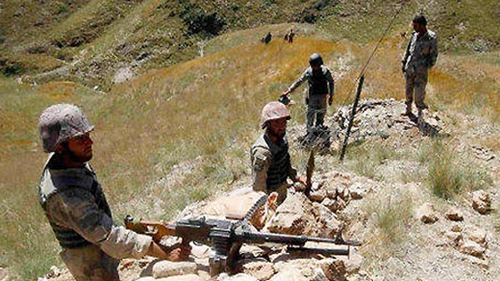 Jammu, Jul 27: Pakistani troops violated ceasefire by targeting Indian posts along the Line of Control in Poonch district with RPGs and heavy machine guns on Saturday morning leading to heavy exchange of fire.
Jammu, Jul 27: Pakistani troops violated ceasefire by targeting Indian posts along the Line of Control in Poonch district with RPGs and heavy machine guns on Saturday morning leading to heavy exchange of fire.
"Pak troops have targeted Indian posts by firing rocket projectile grenades (RPGs) and heavy machine guns along LoC in Doda Battalion forward area in Poonch district since 0730 hours on Saturday," a senior Army officer said.
Indian border troops retaliated effectively, resulting in heavy exchanges which were on for five hours, the officer said.
There was no loss of life or injury to anyone in the firing, he said.
Top Army officials are monitoring the situation in wake of the heavy firing along the border line and troops have been asked in other forward areas to intensify round the clock vigilance.
The firing triggered panic among the people in the area, especially in Shahpur Kerni forward belt in Poonch where it stretched for five hours.
This is fifth ceasefire violation in July this year. On July 3, Pakistan violated ceasefire when it fired on cops, who had gone on LoC in Sabzian, Poonch to collect the body of the of a Pakistani intruder killed in IED blast on July 1.
Pakistani troops fired on troops trying to evacuate injured porters after two were killed in IED attack by Pakistani militants along LoC in Poonch on July 8.
On July 12, Pakistani Rangers fired on Indian forward posts in Pindi belt along international border (IB) in Jammu district of Jammu and Kashmir.
Pakistani troops opened small arms firing on Indian posts in forward area along LoC in Poonch district at on the night of July 22.
There were five ceasefire violation by Pak troops and two during two-day visit of Prime Minister Manmohan Singh and Congress chief Sonia Gandhi to J&K from June 24.
Meanwhile, Pakistan's chief military spokesman Maj Gen Asim Saleem Bajwa said that one Pakistani soldier was killed and another injured in firing by Indian forces along the LoC.
Bajwa claimed the firing by Indian troops was "unprovoked" and had targeted Pakistani posts in Rawlakot area on the LoC.
"Our soldier, Asim Iqbal, was killed and his colleague Muhammad Khan was injured in the unprovoked firing," he said.






Comments
Add new comment